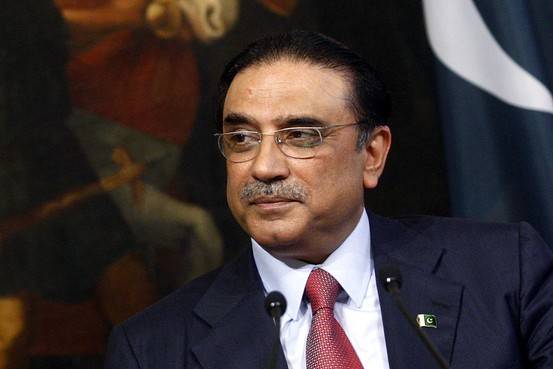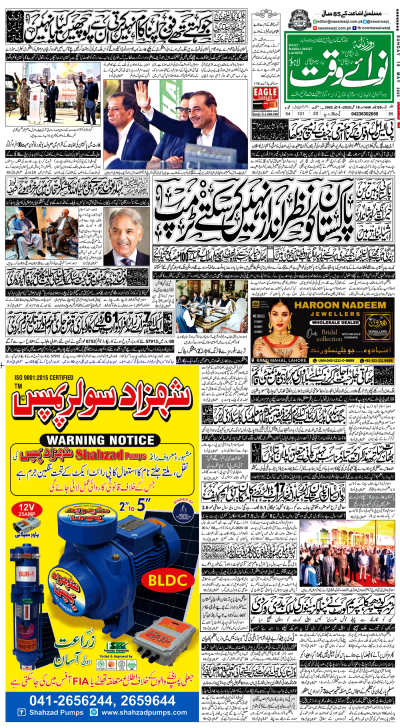ISLAMABAD - Pakistan People’s Party Parliamentarians Chief Asif Ali Zardari believes Sindh Chief Minister Qaim Ali Shah is indispensible in the province to keep the party united, The Nation learnt yesterday. Shah has been the chief minister of Sindh for an unprecedented three times. He was first elected as the chief minister from December 1988 –February 1990, then from April 2008 – March 2013 and from May 2013 till date.
Formerly, Shah has been Federal Minister for Industries and Kashmir Affairs. He won seven out of eight general elections he contested, becoming a member of the provincial assembly six times, and Member of National Assembly and a Senator for once. Since 2014, there were rumours he might be replaced as the Sindh chief minister due to his advanced age and weakening grip but the veteran continued to hold on to power. Shah entered politics on being elected the chairman of Khairpur’s district council under Field Marshal Ayub Khan’s system of Basic Democracy in the 1960s. His close association with PPP founder Zulfikar Ali Bhutto led to his joining the party shortly after its creation in 1967.
He contested general elections of 1970 on a PPP - PPPP’s parent party - ticket from Khairpur Mirs and defeated his opponents, Comrade Syed Baqir Ali Shah of the National Awami Party and Syed Ghous Ali Shah. Recognising young Shah’s capability, Prime Minister Zulfikar Ali Bhutto appointed Qaim Ali Shah to his small cabinet as the Federal Minister for Industries and Kashmir Affairs. After General Ziaul Haq’s coup d'état in July 1977, Shah was arrested along with Bhutto and other cabinet ministers. Unlike other PPP bigwigs such as Ghulam Mustafa Jatoi, Ghulam Mustafa Khar and Mir Hazar Khan Bijarani, who either left the party or became inactive, Qaim Ali Shah remained loyal to the party.
During the eleven years of General Ziaul Haq’s rule, Shah and members of his family suffered imprisonment, torture, virtual poverty - as accounts and lands were seized - and constant fear. Most notably, Shah’s politically active nephew, Syed Pervez Ali Shah Jillani attained ‘Prisoner of Conscience’ status in Amnesty International’s 1985 report for enduring six years of torture in General Ziaul Haq’s torture cells. Benazir Bhutto’s autobiography, Daughter of the East, records Pervez Ali Shah’s ordeal in greater detail.
After General Ziaul Haq’s death and Benazir Bhutto’s return to the country, Shah was appointed the President of PPP Sindh in recognition of his services to the Movement for Restoration of Democracy and the PPP. His landslide victory in the 1988 elections from his constituency, Khairpur Mirs, paved way for his appointment as the 17th Chief Minister of Sindh on December 2, 1988.Subsequently, Shah was elected as a Member of Provincial Assembly in 1990, 1993, 2002 and 2008. He lost the only election of his career in 1997 when the PPP was nearly routed from parliament.
Later, he made a bid for a Senate seat, and won his first and only term in late 1997. Of his eight children, his daughter Dr Nafisa Shah is politically active and is a member of the National Assembly. A senior PPPP leader told The Nation, Zardari respected Shah’s loyalty with the party and was never in favour of replacing him.“There have been voices from inside the party to replace Shah but it never got the required support. Zardari believes Shah is indispensible,” he added.
He said some reports referred to Bilawal Bhutto Zardari of supporting a new chief minister but Bilawal had never discussed this in any meeting. “Bilawal wants young people to lead the party but respects experience. He never spoke of change in the CM’s House,” the PPPP leader said. He claimed Shah was keeping the party united in Sindh and any change could open the doors for split. Another senior PPPP leader, Qamar Zaman Kaira, said Shah had sacrificed a lot for the party and the top leadership respected his loyalty.
“He has been a great worker of the party. He stood tall against dictatorship and he has led the Sindh government well in all the three terms so far,” he added. Kaira said Sindh cannot be compared to Punjab as it lacked resources to speed up development like the bigger counterpart. “There has been development as per Sindh’s resources. Shah has performed well keeping in view the challenges in the province,” said the PPPP leader.
Asked, if Shah would complete his term in office until 2018, Kaira said, “This is not for me to decide. The PPPP leadership takes such decisions. Even if there are changes, it is part of democracy.”The PPPP leader said the reorganisation of the party was on cards across the country. “There will be changes in Sindh too but this would be decided by the party. The decisions will not be media driven or influenced by speculations,” he contended. Questioned, if Zardari and the party were satisfied with Shah’s performance, he said, “He is performing well that’s why he is the chief minister.” Earlier, Asif Ali Zardari had himself rejected reports about likely changes in the political set-up in Sindh.
“We are not changing the Sindh chief minister,” Zardari said as the rumour mills indicated a change at the top was in the offing. Chief Minister Shah also strongly dispelled the impression that there was any move within his party to get him replaced as chief executive of the province. “Party chairman and co-chairman can take any decision. Differences of opinion is the beauty of democracy,” he recently said.






